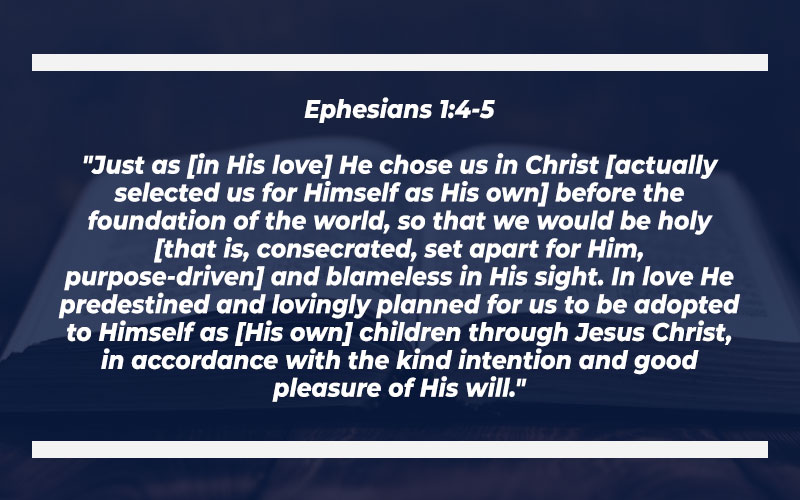Predestination is a profound theological concept found throughout the Bible, referring to God’s sovereign choice in determining the destiny of individuals and events. It speaks to God’s omniscience and omnipotence, underscoring that He has a plan for all creation, which includes the salvation of His people. The verses below explore various aspects of predestination, revealing God’s divine purpose and the assurance that believers have in His eternal plan.
Also Read: Bible Verses About Heaven and Eternal Life
Bible Verses About Predestination
Ephesians 1:4-5
“Just as [in His love] He chose us in Christ [actually selected us for Himself as His own] before the foundation of the world, so that we would be holy [that is, consecrated, set apart for Him, purpose-driven] and blameless in His sight. In love He predestined and lovingly planned for us to be adopted to Himself as [His own] children through Jesus Christ, in accordance with the kind intention and good pleasure of His will.”

Commentary: This passage emphasizes that God’s predestination is rooted in His love. Before the world was even created, He chose His people to be holy and blameless, set apart for His divine purpose. The idea of being predestined for adoption through Jesus Christ reveals the depth of God’s grace and His sovereign will in bringing believers into His family.
Romans 8:29-30
“For those whom He foreknew [and loved and chose beforehand], He also predestined to be conformed to the image of His Son [and ultimately share in His complete sanctification], so that He would be the firstborn [the most beloved and honored] among many believers. And those whom He predestined, He also called; and those whom He called, He also justified [declared free of the guilt of sin]; and those whom He justified, He also glorified [raising them to a heavenly dignity].”
Commentary: This verse outlines the golden chain of salvation, beginning with God’s foreknowledge and culminating in glorification. It highlights the certainty of God’s purpose for those He predestines, ensuring their transformation into Christ’s likeness, their calling, justification, and eventual glorification in Him.
2 Timothy 1:9
“For He delivered us and saved us and called us with a holy calling [a calling that leads to a consecrated life—a life set apart—a life of purpose], not because of our works [or because of any personal merit—we could do nothing to earn this], but because of His own purpose and grace [His amazing, undeserved favor] which was granted to us in Christ Jesus before the world began [eternal ages ago].”
Commentary: Paul reminds Timothy that the call to salvation and holiness is based entirely on God’s purpose and grace, not on human merit. This eternal plan, established before time began, underscores God’s sovereignty and the certainty of His will being fulfilled in the lives of those He calls.
Ephesians 1:11
“In Him also we have received an inheritance [a destiny—we were claimed by God as His own], having been predestined [chosen, appointed beforehand] according to the purpose of Him who works everything in agreement with the counsel and design of His will.”
Commentary: This verse reinforces the idea that believers’ inheritance and destiny are a result of God’s predestined plan. It affirms that God’s will and purpose guide all things, and that those who are in Christ are secure in His eternal plan.
John 6:44
“No one can come to Me unless the Father who sent Me draws him [giving him the desire to come to Me]; and I will raise him up [from the dead] on the last day.”
Commentary: Jesus emphasizes that coming to Him is not based on human initiative but on the Father’s drawing. This verse highlights the divine aspect of salvation, where God, in His sovereignty, initiates and ensures the salvation of those He has chosen.
Acts 13:48
“When the Gentiles heard this, they began rejoicing and glorifying [praising and giving thanks for] the word of the Lord; and all those who had been appointed (designated, ordained) to eternal life believed [in Jesus as the Christ and their Savior].”
Commentary: The reaction of the Gentiles to the gospel message is a testimony to God’s predestined plan. Those who believed were those who had been appointed to eternal life, underscoring the role of divine election in the salvation of individuals.
1 Peter 1:2
“[Chosen and destined by God the Father and sanctified by the Spirit to be obedient to Jesus Christ and to be sprinkled with His blood: May grace and peace [that special sense of spiritual well-being] be yours in increasing abundance [as you walk closely with God].”
Commentary: Peter speaks to believers as those who have been chosen according to God’s foreknowledge. The work of sanctification by the Spirit and the call to obedience to Christ are rooted in God’s eternal purpose, assuring believers of their secure position in God’s plan.
Romans 9:15-16
“For He says to Moses, ‘I will have mercy on whomever I have mercy, and I will have compassion on whomever I have compassion.’ So then, God’s choice is not dependent on human will, nor on human effort [the totality of human striving], but on God who shows mercy [to whomever He chooses—it is His sovereign gift].”
Commentary: Paul’s words emphasize the sovereignty of God in dispensing mercy and compassion. Salvation and God’s choice are not based on human efforts or desires but on His sovereign will, further illustrating the doctrine of predestination.
2 Thessalonians 2:13
“But we should and are morally obligated [as debtors] always to give thanks to God for you, [believers] beloved by the Lord, because God has chosen you from the beginning for salvation through the sanctifying work of the Spirit [that sets you apart for God’s purpose] and by your faith in the truth [of God’s word that leads you to spiritual maturity].”
Commentary: This verse highlights the dual role of God’s choice and the Spirit’s sanctifying work in the salvation of believers. Paul gives thanks for the Thessalonians, acknowledging that their salvation was part of God’s eternal plan, manifested through their faith and sanctification.
Matthew 22:14
“For many are called (invited, summoned), but few are chosen.”
Commentary: Jesus’ words in this parable emphasize the distinction between the general call to salvation and the specific choosing of individuals. While many may hear the gospel, only those chosen by God respond in faith, underscoring the doctrine of election within predestination.
Proverbs 16:4
“The Lord has made everything for its own purpose, even the wicked [according to their role] for the day of evil.”
Commentary: This verse speaks to God’s sovereign purpose in all things, even in the existence of the wicked. It underscores the idea that nothing is outside of God’s control and that His plans are ultimate and will come to fruition according to His divine will.
Psalm 33:11
“The counsel of the Lord stands forever, the thoughts and plans of His heart through all generations.”
Commentary: This verse affirms the unchanging nature of God’s plans and purposes. His counsel is eternal and will endure through all generations, giving believers confidence that God’s predestined plan is both steadfast and reliable.
Isaiah 46:9-10
“Remember [carefully] the former things which I did from ages past; For I am God, and there is no one else; I am God, and there is no one like Me, declaring the end and the result from the beginning, and from ancient times the things which have not [yet] been done, saying, ‘My purpose will be established, and I will do all that pleases Me and fulfills My purpose,’”
Commentary: In this passage, God asserts His sovereignty, declaring that His purpose will be accomplished from beginning to end. It highlights God’s omniscience and omnipotence, assuring believers that His predestined plans are certain to come to pass.
Jeremiah 1:5
“Before I formed you in the womb I knew you [and approved of you as My chosen instrument], And before you were born I consecrated you [to Myself as My own]; I have appointed you as a prophet to the nations.”
Commentary: God’s words to Jeremiah reveal that His plans and purposes for individuals are established even before their birth. This verse illustrates the personal aspect of predestination, where God intimately knows and appoints His servants for specific roles within His divine plan.
Also Read: Bible Verses About Living Life with Purpose
Deuteronomy 7:6
“For you are a holy people [set apart] to the Lord your God; the Lord your God has chosen you out of all the peoples on the face of the earth to be a people for His own possession [that is, His very special treasure].”
Commentary: This verse emphasizes Israel’s unique position as God’s chosen people. It underscores God’s sovereign choice in setting apart a people for Himself, which is a theme carried forward into the New Testament understanding of the church as God’s chosen people.
Isaiah 42:1
“Behold, My Servant, whom I uphold; My chosen one in whom My soul delights. I have put My Spirit upon Him; He will bring forth justice to the nations.”
Commentary: This prophecy concerning the Messiah reflects God’s predestined plan for salvation. Jesus, the chosen servant, is anointed by God to fulfill the divine purpose of bringing justice to the nations, highlighting the fulfillment of God’s sovereign will in Christ.
Isaiah 49:1
“Listen to Me, O islands and coastlands, And pay attention, you peoples from far away. The Lord has called Me from the womb; From the body of My mother He has named Me.”
Commentary: This verse speaks prophetically of the Messiah, affirming God’s predestination in calling Him from the womb. It underscores the divine plan established before birth, demonstrating God’s sovereignty in orchestrating the life and mission of His chosen one.
John 15:16
“You have not chosen Me, but I have chosen you and I have appointed and placed and purposefully planted you, so that you would go and bear fruit and keep on bearing, and that your fruit will remain and be lasting, so that whatever you ask of the Father in My name [as My representative] He may give to you.”
Commentary: Jesus’ words to His disciples emphasize that it is not by human choice that they follow Him, but by His sovereign election. The purpose of this divine choice is fruitfulness in their lives, which is a testament to the predestined plan of God in their calling and mission.
Romans 11:5
“So too then, at the present time there has come to be a remnant [a small believing minority], according to [God’s] gracious choice.”
Commentary: Paul speaks of a remnant chosen by grace, illustrating God’s sovereign election within Israel. This verse highlights the theme of predestination as God’s selective process in preserving a faithful remnant according to His divine purpose.
Romans 11:7
“What then? Israel failed to obtain what it was seeking [that is, God’s favor by obedience to the Law]. But the elect [those chosen few] obtained it, while the rest of them became hardened and callously indifferent.”
Commentary: This verse contrasts the elect with the rest of Israel, illustrating the idea that only those chosen by God obtain His favor. The hardening of others highlights the mystery of God’s sovereign choice in predestination, which ensures that His purpose is fulfilled in the lives of the elect.
Matthew 24:22
“And if those [days of tribulation] had not been cut short, no human life would be saved; but for the sake of the elect (God’s chosen ones) those days will be shortened.”
Commentary: Jesus speaks of the end times, noting that the days of tribulation will be shortened for the sake of the elect. This verse affirms God’s protective care over His chosen people, underscoring the importance of predestination in ensuring the survival and salvation of the elect.
2 Peter 1:10
“Therefore, believers, be all the more diligent to make certain about His calling and choosing you [be sure that your behavior reflects and confirms your relationship with God]; for by doing these things [actively developing these virtues], you will never stumble [in your spiritual growth and will live a life that leads others away from sin];”
Commentary: Peter encourages believers to confirm their calling and election by living lives that reflect their relationship with God. This verse emphasizes the practical outworking of predestination in the believer’s life, showing that God’s choice has ethical and spiritual implications for daily living.
Jude 1:4
“For certain people have crept in unnoticed [just as if they were sneaking in by a side door]. They are ungodly persons whose condemnation was predicted long ago, for they distort the grace of our God into decadence and immoral freedom [viewing it as an opportunity to do whatever they want] and deny and disown our only Master and Lord, Jesus Christ.”
Commentary: Jude warns of those who are predestined for condemnation, illustrating the darker aspect of predestination where God’s sovereignty is also evident in the judgment of the ungodly. This verse serves as a sobering reminder of the consequences of rejecting God’s grace.
John 17:6
“I have manifested Your name to the people whom You have given Me out of the world. They were Yours, and You gave them to Me, and they have kept Your word.”
Commentary: Jesus’ prayer highlights the predestined relationship between the Father and those He has given to the Son. It underscores the divine selection and the secure position of believers who are entrusted to Christ by the Father.
1 Corinthians 1:27-29
“But God has selected [for His purpose] the foolish things of the world to shame the wise [revealing their ignorance], and God has selected [for His purpose] the weak things of the world to shame the things which are strong [revealing their frailty]. God has selected [for His purpose] the insignificant [base] things of the world, and the things that are despised and treated with contempt, even the things that are nothing, so that He might reduce to nothing the things that are, so that no one may [be able to] boast in the presence of God.”
Commentary: Paul reveals God’s predestined plan to choose the lowly and despised to accomplish His purposes. This selection demonstrates God’s sovereignty and His intention to eliminate human pride, ensuring that all glory is directed to Him alone.
Colossians 3:12
“So, as God’s own chosen people, who are holy [set apart, sanctified for His purpose] and well-beloved [by God Himself], put on a heart of compassion, kindness, humility, gentleness, and patience [which has the power to endure whatever injustice or unpleasantness comes, with good temper];”

Commentary: Paul exhorts the Colossians to live in a manner befitting their status as God’s chosen people. This verse underscores the ethical implications of predestination, where being chosen by God is accompanied by a call to embody Christ-like virtues in daily life.
1 Thessalonians 5:9
“For God has not destined us to incur His wrath, but [to obtain] salvation through our Lord Jesus Christ,”
Commentary: This verse assures believers of their predestined salvation through Jesus Christ. It contrasts the destiny of believers with that of those who are under God’s wrath, highlighting the security and hope that come from being part of God’s predestined plan for salvation.
1 Peter 2:9
“But you are a chosen race, a royal priesthood, a consecrated nation, a [special] people for God’s own possession, so that you may proclaim the excellencies [the wonderful deeds and virtues and perfections] of Him who called you out of darkness into His marvelous light.”
Commentary: Peter reminds believers of their identity as a chosen people, set apart by God for His purposes. This verse emphasizes the honor and responsibility of being predestined to proclaim the greatness of God, who has brought them into His light.
Titus 1:1-2
“Paul, a bond-servant of God and an apostle (special messenger, personally chosen representative) of Jesus Christ, for the faith of God’s chosen ones and the recognition and knowledge of the truth which is according to godliness, based on the hope and divine guarantee of eternal life, [the life] which God, who is ever truthful and without deceit, promised before the ages of time began,”
Commentary: Paul speaks of his ministry as being for the sake of God’s chosen ones, grounded in the promise of eternal life that God made before time began. This verse highlights the eternal aspect of God’s predestined plan, which was established before the creation of the world.
Revelation 13:8
“All the inhabitants of the earth will fall down and worship him, everyone whose name has not been written [since the foundation of the world] in the Book of Life of the Lamb who has been slain [as a willing sacrifice].”
Commentary: This verse speaks of those whose names are written in the Book of Life, a testament to God’s predestined plan for salvation. It contrasts the fate of the elect with those who worship the beast, emphasizing the eternal security of those chosen by God.
Revelation 17:14
“They will wage war against the Lamb (Christ), and the Lamb will triumph and conquer them, because He is Lord of lords and King of kings; and those who are with Him and on His side are the called and chosen and faithful.”
Commentary: This verse depicts the ultimate victory of Christ and His chosen people. It affirms the security and triumph of those predestined by God to be with Christ, highlighting the faithful’s role in the fulfillment of God’s sovereign plan.
Also Read: Bible Verses About Going To Heaven





Bible Commentary, Blog
50 Important bible verses about the love of god (With Explanation)